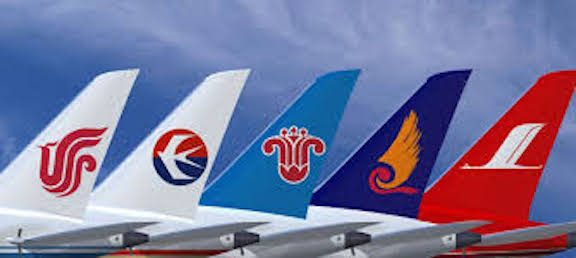The Trump administration issued an order suspending passenger flights from China-based airlines, saying it was retaliation for Beijing barring American carriers from re-entering that market, in a continued escalation of tensions between the two nations.
The order issued Wednesday goes into effect June 16 but President Donald Trump can act sooner if he chooses, the Department of Transportation said in a statement.

The move ramps up tensions between the U.S. and China, adding to disputes over trade, the coronavirus pandemic and the treatment of Hong Kong. On Friday, Trump said that the U.S. would “begin the process” of eliminating the policy exemptions that allow America to treat Hong Kong differently than the mainland. China’s leaders recently moved to impose sweeping new national security legislation on the Asian financial hub.
Beijing has prevented U.S. carriers from restarting service there while four of its airlines have maintained flights to and from markets here this year as Covid-19 erupted, according to the statement. U.S. airlines had asked to resume service as early as June 1.
“The Chinese government’s failure to approve their requests is a violation of our Air Transport Agreement,” the DOT said in an emailed statement.
The order stops short of an outright ban, allowing Chinese carriers to operate one flight to the U.S. for each flight that nation grants to American carriers.
The order is aimed at Air China Ltd., China Eastern Airlines Corp., China Southern Airlines Co. and Xiamen Airlines Co. The news came after the close of trading in Shanghai and Hong Kong, which are major trading centers for publicly held Chinese airlines.
It isn’t clear how the DOT order could impact the burgeoning air cargo operations between the U.S. and China.
Several U.S. passenger airlines have begun flying cargo in empty passenger planes as they struggle for revenue during the unprecedented downturn caused by the virus.
At the same time, air-freight haulers such as FedEx Corp. and United Parcel Service Inc. have had to ramp up operations in China to fulfill demand for medical supplies and other equipment.
The trade group that represents large U.S. carriers, Airlines for America, didn’t immediately comment on the action. China’s embassy in Washington also didn’t immediately respond to an emailed request for comment.
The department on May 22 said China had violated a bilateral agreement allowing airline service between the two countries by failing to respond to requests by Delta and United. The department accused China of unfairly blocking the carriers’ attempts to resume service in that country.
The DOT on Wednesday accused the Civil Aviation Authority of China of being “unable to communicate definitively” when it will allow U.S. airlines to resume flights.
Delta originally sought to resume China flights on June 1 but has had to delay because the Chinese government hasn’t approved its application. It’s currently seeking to restart flights on June 11 between Detroit and Shanghai and Seattle and Shanghai, both with stops in Seoul.
“We support and appreciate the U.S. government’s action to enforce our rights and ensure fairness,” the Atlanta-based carrier said in a statement.
American’s last China flights departed on Jan. 31. It’s currently set to resume flights between Dallas-Fort Worth and Hong Kong next month, with other passenger service scheduled to restart in October. American has an average of six total daily non-stop flights to the cities of Hong Kong, Shanghai and Beijing from Dallas-Fort Worth and Los Angeles.
United also plans to resume three routes to China as early as this month, pending regulatory approval. That would be for service from San Francisco to Beijing and Shanghai, and between Newark, New Jersey, and Shanghai.
In early January, there had been approximately 325 weekly scheduled flights between the two countries. That fell to only 20 per week by four Chinese carriers by mid-February, according to the DOT.
Earlier this year China said in an order that airlines couldn’t operate more flights than they had scheduled on March 12. However, by that time, U.S. carriers weren’t flying there, making it impossible for them to resume service, the DOT charged.China’s order “effectively precludes U.S. carriers from reinstating scheduled passenger flights to and from China and operating to the full extent of their bilateral rights, while Chinese carriers are able to maintain scheduled passenger service to and from each foreign market served as of the baseline date, including the United States,” the DOT said in its order.











